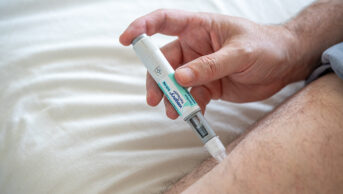
Shutterstock.com
The over-the-counter cough suppressant dextromethorphan boosts insulin levels and improves glucose tolerance in patients with type 2 diabetes and could lead to the development of an adjunct therapy for diabetes patients, according to the findings of a study.
Insulin-producing beta cells located in the islets of Langerhans are known to express N-methyl-D-aspartate receptors (NMDARs) which bind to dextromethorphan. But the function of NMDARs was unclear. Evidence from previous studies conflicted over whether NMDAR antagonists, like dextromethorphan, increased or decreased insulin secretion and glucose control.
Eckhard Lammert and his team at the metabolic physiology laboratory at Heinrich Huhne University in Düsseldorf, Germany, deleted genes encoding NMDARs in a cell model of insulin-secreting beta cells, and in the mouse pancreas. They also blocked NMDARs pharmacologically in the cultured cells, and in mouse and human islets. Finally, they treated diabetic mice with dextromethorphan and, in a phase IIa clinical trial involving 20 men with type 2 diabetes, they showed that dextromethorphan treatment increased serum insulin concentrations and lowered blood glucose.
Inhibition of pancreatic NMDARs in vitro and in vivo was found to increase glucose-stimulated insulin secretion, enhance islet cell survival, and improve islet function under diabetogenic conditions in vivo.
“We expected the opposite,” says Lammert, who led the study published in Nature Medicine
[
1]
on 16 March 2015.
The findings suggest dextromethorphan may be a useful adjunct therapy, says Daniel Konrad at the department of paediatric endocrinology and diabetology at the University Children’s Hospital, Zurich, Switzerland. “I am surprised since we described in our Diabetologia paper the opposite finding[2]
,” says Konrad. Konrad reported that diabetes was induced, rather than suppressed, by dextromethorphan.
The big question, says Konrad, is “whether dextromethorphan will have a long-term beneficial effect in patients with type 2 diabetes”.
Lammert is planning two further trials — one to treat patients for three months on a low dose of dextromethorphan, and one to treat patients with type 1 diabetes during what is called the ‘honeymoon period’. This temporary period, often seen in children or teenagers immediately after diagnosis, is characterised by low insulin levels that keep blood glucose levels normal. “The key thing now is to see what happens if people take dextromethorphan for several months,” says Lammert.
References
[1] Marquard J, Otter S, Welters A, et al. Characterization of pancreatic NMDA receptors as possible drug targets for diabetes treatment. Nature Medicine 16 March 2015 doi:10.1038/nm.3822
[2] Konrad D, Sobetzko D, Schmitt B, et al. Insulin-dependent diabetes mellitus induced by the antitussive agent dextromethorphan. Diabetologia 2000; 43,261–262.


